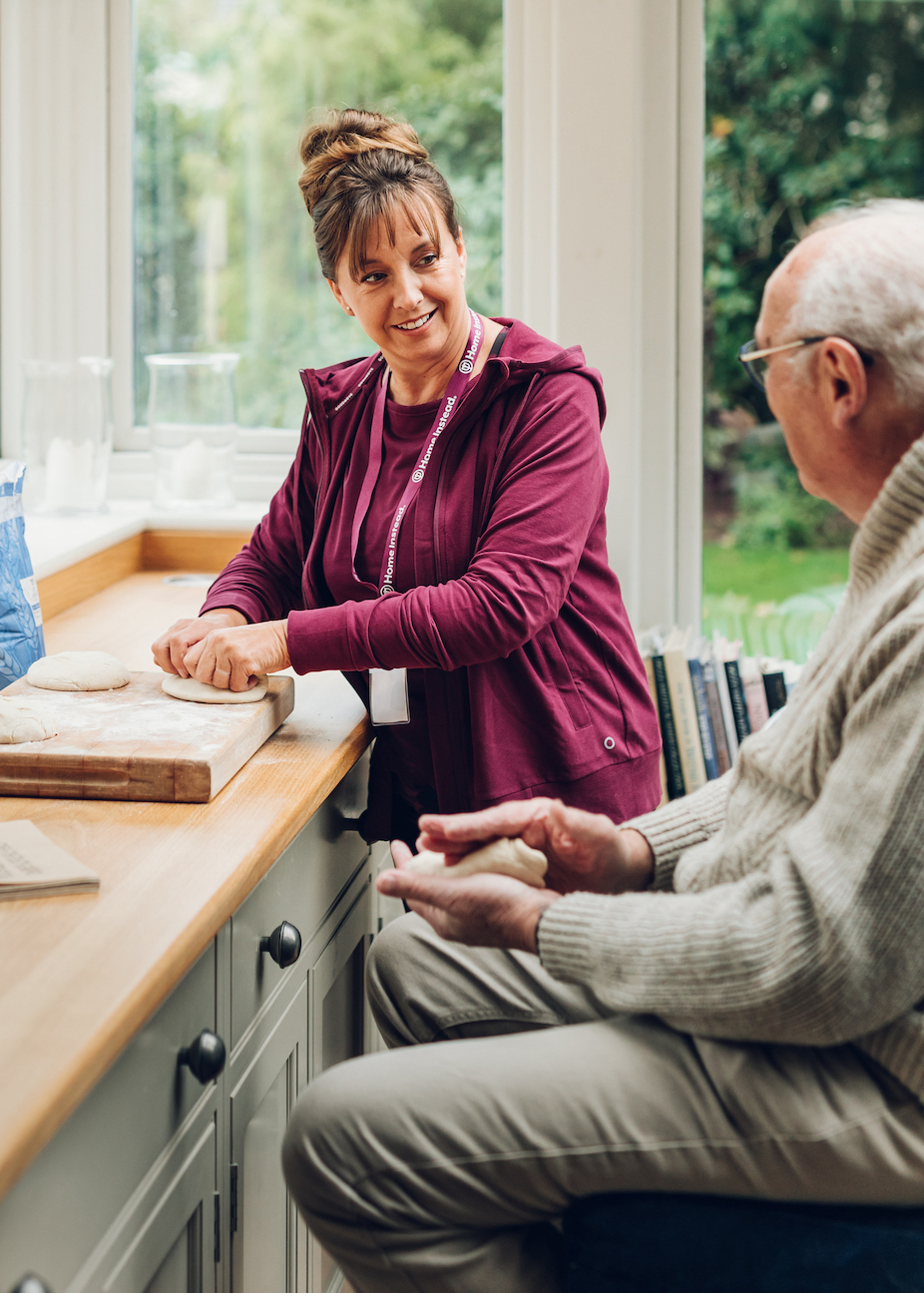Live-In Care is a type of service that allows you to hire a professional caregiver to come into your home and provide around-the-clock assistance. Live-in caregivers can help with activities of daily living, like bathing, dressing, eating, toileting, medication management, etc. They can also assist with specialised services, like wound care, physical therapy, occupational therapy, etc.
Full-time care at home can often be the ideal solution for those seeking elderly care. As a real alternative to a nursing home or care facility. It enables them to continue living comfortably in their own homes and keep up with hobbies and interests. All while remaining near to friends and family. But the biggest benefit of live-in care is that they can keep independence and generally continue to live the life you’ve always had.
Another implementation for live-in care would be respite care, which would allow a family caregiver to take a break from caring for someone.
If you think you may require hands-on support, you’ll need to contact a healthcare professional or social worker.
Live-in Care Means
Live-in care means having a fully trained carer living with you in your own home. Your live-in carer will give you around-the clock care and will support you with your specific needs to keep you comfortable and independent at home.
Live-in care is delivered within a care seeker's own home. Sometimes by two Carers who (alternately) live in a room of the care seeker's house. The Carer will be on hand 24-hours a day to support the care seeker with their care needs.

What exactly does 24-hour live-in care mean?
Expert clinical nurses who have extensive experience in caring for your specific needs deliver specialist live-in care services.
But each live-in carer has their own level of experience, qualifications, background, and interests. Meaning that you can find your ideal care companion no matter your health issue or circumstance.
If you want to receive live-in care, you can choose a care professional to live in your home with you, much like a housemate or lodger.
Due to the 24-hour care that live-in care workers need to provide, many agencies have a team of 2 carers assigned to each client.
Using a live-in caregiver rather than residential care allows you to maintain greater control over your daily activities. You will still be receiving quality care and assistance, but you’re able to keep your home as your own and remain in familiar surroundings.
This means that you, the care recipient, can maintain your independence, your mobility, without feeling imposing on family members.
The upheaval and worry of leaving your home and moving into a care facility, can have a significant negative impact on your mental health and wellbeing. Using live-in care can avoid this.
It prevents elderly people from having to leave their homes, where they have spent years accumulating memories. It helps them maintain their way of life and cherished, beloved pets.

Do Caregivers get Breaks?
It’s crucial to keep in mind that one-on-one, round-the-clock care means the care recipient and the caregiver will need to have a good relationship. This is ideal if the care recipient wants friendly company.
Even though the professional carer lives in your house, they shouldn’t be on call to provide care around the clock. Depending on your patterns and preferences, a normal day may be divided into work and downtime.
Most caregivers work an average of six to seven days a week for eight to ten hours each day.
24-hour home care assistants can support complex care for medical and specialist conditions like dementia, Parkinson's or Multiple Sclerosis. There is no need to go into a care home to receive this level of care.
Live-in care is ideal for:
- Dementia Care
- Domiciliary Care
- Respite Care
- Short-Term Care
- Neurological care
- Spinal injuries
- Brain injuries
- Palliative and end-of-life care
- Home from hospital
Live-in Carer Job Description
The main objective of a live-in care provider is to improve a vulnerable person’s quality of life. The nature of this care is unique to each person. The care provider will help them move around their home, providing a listening ear and emotional support. As well as ensuring that they are up to date on medication.
Every care plan is tailored to the individual. Therefore, the type of care your live-in carer supports you with depends entirely on you.
Some people may merely need company and domestic assistance from a professional carer. While others may require temporary specialised care to address particular health conditions.
The care provider should always be completely qualified, well-trained, and offer a personalised service.
A live-in caregiver should prioritise your health and take the time to learn about your preferences and wishes.
Live-in carers can provide specialist care in a wide range of specialisms, including dementia, palliative care, and end-of-life care.
Experienced and highly trained live-in carers provide the highest quality of care to both patients and their families.
Live-in Carers & Services Provided
Depending on your requirements, a live-in care service key duties can include:
- Help with getting out of bed in the morning and getting into bed at night
- Daily tasks like dressing and undressing
- Washing, bathing, showering and other personal care tasks
- Medication administration
- Continence management
- Support with mobility in the home and getting out and about doing your favourite hobbies
- Pet care
- Emotional support and companionship
- Hair and nail care
- Daily life monitoring of diabetes and blood pressure
- Everyday tasks like food shopping and running errands or attending social activities
- Managing dietary and nutritional needs, cooking your favourite meals or meal preparation
- Household tasks such as cleaning, laundry and other daily domestic tasks
Personalised support with a Personalised plan
All care packages are bespoke services. Make sure you are only paying for the high-quality care you need.
The comprehensive care plan will be created with input, not just from the person receiving care, but with vital input from family members. Other healthcare professionals involved in your care can also contribute to the care plan. It will cover not just your care needs, but your choices on how you live your life, your preferences and the social and emotional support required. It is a holistic approach that is focused on enhancing health and wellbeing, whilst improving the overall quality of life.

- Why choose live-in care?
One of the main benefits of live-in care is that it helps care recipients retain as much of their independence and dignity as possible. Whilst they safely receive a service tailored to their needs.
With live-in home carers, clients can maintain ownership of their homes and the familiarity of their own homes. Providing care in their family home has shown major benefits in improving overall health and wellbeing for a person living with dementia.
How can you pick the right live-in carer for you?
- When you receive home care, it’s not just about getting the services you need and having your medical requirements met.
- Equally crucial is that the caregiver respects your privacy, house rules, and wants and that you get along with them.
- Another aspect is your budget. Given how expensive home care may be, it is crucial to get it right.
- It is crucial that you confirm the care worker has had a thorough Disclosure and Barring Service (DBS) check. As they will be living in your house.
Frequently Asked Questions
If your loved one needs more complex medical care, such as diabetes management, or requiring regular ventilation, then you can have live-in care. But you may need to find specialist carers.
Live-in care can offer a realistic, affordable alternative to residential care. Live-in care fees are structured based on the level of care and support you need. You’ll see that it often costs less than residential, nursing home care. A live-in care package can be very cost-effective.
In the UK, you should budget at least £900 to £1,400 a week and up to about £2,000.
The live-in care package must be customised to your specific needs because of the costs; this might benefit you to avoid paying for services that you do not require.
You might not be required to cover all of the expenses, though. Your local council may cover all or part of the fees, depending on your savings, assets, and income.
Additionally, through NHS Continuing Healthcare, individuals with complicated medical needs may have all of their care covered by the NHS.
Live-in care for couples is a very cost-effective option when compared to needing two packages of care in a care home. With live-in care, there is only a nominal additional fee to provide care to a couple.



